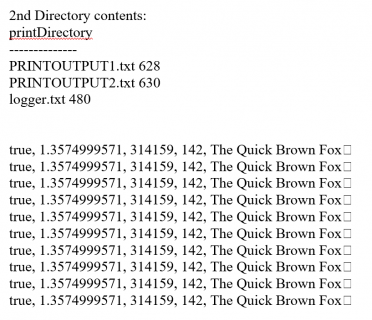D:\Users\Merli\Documents\Arduino\littlefs_teensy_test3\littlefs_teensy_test3.ino Nov 6 2020 07:30:50
LittleFS Test
printDirectory
--------------
Using println and printf to printoutput file
opened PRINTOUTPUT1.txt
opened PRINTOUTPUT2.txt
printDirectory
--------------
FILE PRINTOUTPUT1.txt 628
FILE PRINTOUTPUT2.txt 630
-------------------------------
File1 contents:
-------------------------------
File1 size: 628
abcdefghijklmnopqrstuvwxyz
Rec: 0, Float: 26.400000, Int: 98
abcdefghijklmnopqrstuvwxyz
Rec: 1, Float: 27.400000, Int: 99
abcdefghijklmnopqrstuvwxyz
Rec: 2, Float: 28.400000, Int: 100
abcdefghijklmnopqrstuvwxyz
Rec: 3, Float: 29.400000, Int: 101
abcde
ghijklmnopqrstuvwxyz
Rec: 4, Float: 30.400000, Int: 102
abcdefghijklmnopqrstuvwxyz
Rec: 5, Float: 31.400000, Int: 103
abcdefghijklmnopqrstuvwxyz
Rec: 6, Float: 32.400000, Int: 104
abcdefghijklmnopqrstuvwxyz
Rec: 7, Float: 33.400000, Int: 105
abcdefghi
klmnopqrstuvwxyz
Rec: 8, Float: 34.400000, Int: 106
abcdefghijklmnopqrstuvwxyz
Rec: 9, Float: 35.400000, Int: 107
-------------------------------
File3 byte conversion test:
-------------------------------
Data_0: true
Data_1: 1.3574999571
Data_2: 314159
Data_3: 142
19
The Quick Brown Fox
Init Done - array loaded
...... ...... ......
create folder
success
2nd Directory contents:
printDirectory
--------------
FILE PRINTOUTPUT1.txt 628
FILE PRINTOUTPUT2.txt 630
DIR structuredData /
FILE logger.txt 480
true, 1.3574999571, 314159, 142, The Quick Brown Fox
true, 1.3574999571, 314159, 142, The Quick Brown Fox
true, 1.3574999571, 314159, 142, The Quick Brown Fox
true, 1.3574999571, 314159, 142, The Quick Brown Fox
true, 1.3574999571, 314159, 142, The Quick Brown Fox
true, 1.3574999571, 314159, 142, The Quick Brown Fox
true, 1.3574999571, 314159, 142, The Quick Brown Fox
true, 1.3574999571, 314159, 142, The Quick Brown Fox
true, 1.3574999571, 314159, 142, The Quick Brown Fox
true, 1.3574999571, 314159, 142, The Quick Brown Fox


